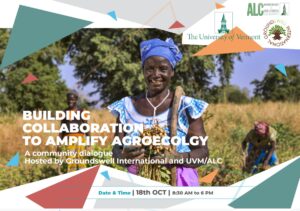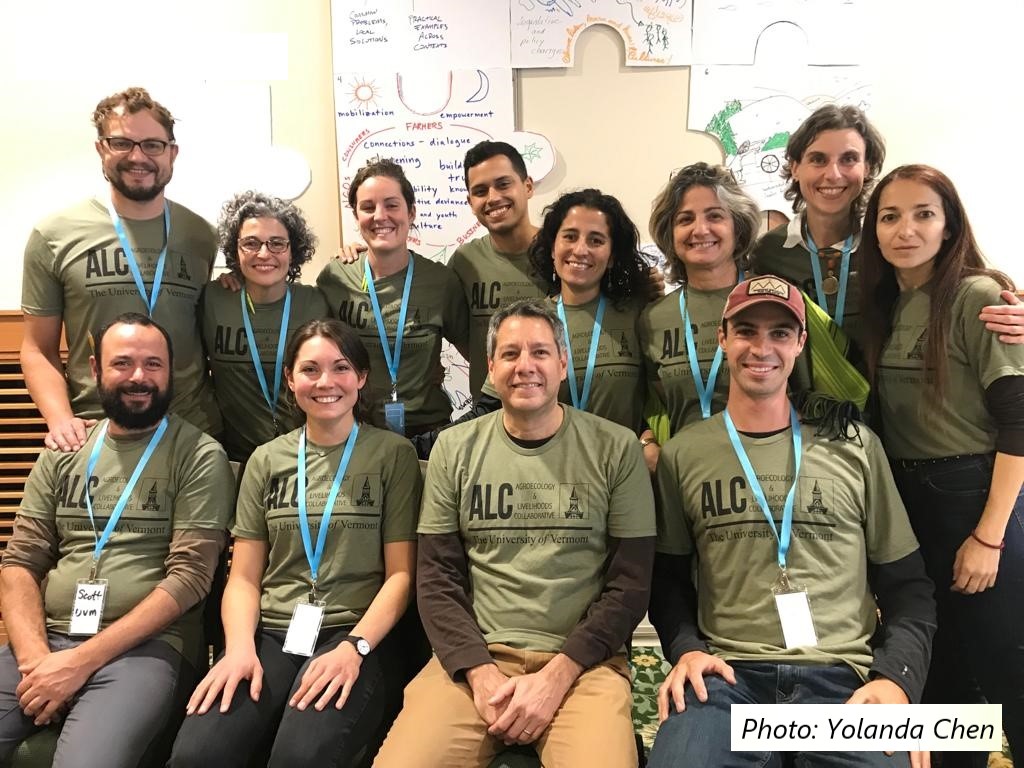Engaging in New Partnerships for Agroecological Transformation
By Ava Murphey, ALC Program Coordinator
8 January 2020
Earlier this year, the University of Vermont’s Agroecology and Livelihoods Collaborative (ALC) signed a memorandum of understanding (MOU) with four pertinent organizations that promote agroecological and development work in various sectors. These links were fused in an effort to formalize the co-creation of knowledge via innovative partnerships, outlining the intention for collaborative movement building. The goal of such an agreement is for all parties to engage in the synergistic sharing and receiving of knowledge and ideas in order to stimulate, cultivate, and propagate purposeful transformative projects.
In maintaining partnerships that span across different sectors, spheres of influence, and geographic regions the potential for amplified impact and transformation is high. The organizations with which the ALC has recently signed an MOU are Groundswell International, EcoSur, Statistics for Sustainable Development (Stats4SD), and the Centre for Agroecology, Water, and Resilience (CAWR). To name a few, these associations represent ties between academia, public research and development projects, grassroots organizing, and effective statistical analysis. This cooperative approach to co-creation and horizontal knowledge sharing is a direct manifestation of one of agroecology’s foundational principles: transdisciplinarity. The relationship between these groups and disciplines holds the immense capacity for transformative systems change, something which profoundly aligns with and enhances the mission of the ALC and their professional partners.
Collaboration in action
One partnership worth highlighting is that with Groundswell International. In October of 2018, Groundswell contracted the ALC to support participatory monitoring and evaluation on a project focused on strengthening farmer seed systems with eight organizations in southern Mexico. A year later, on October 18th, 2019 the two organizations celebrated the result of abundant planning and coordinating in their first ever official collaborative occasion, a one-day participatory event that took place at the University of Vermont’s (UVM) Alumni House. The event, titled “Building Collaboration to Amplify Agroecology,” was an engaging and inspiring day that left participants feeling poised to build bridges and tackle the issues they face in their various professional sectors.

To give some context to the conversation, it is important to highlight the essence of the association between Groundswell International and the ALC. Of critical relevance in the linkage between these two groups is the study and practice of agroecology. In its simplest form, agroecology provides the lens with which to observe ecological processes and their applications to agricultural production systems1. However, agroecology encompasses much more than scientific observation; it is a transdisciplinary approach (merging ecological science with social science, local and indigenous knowledge systems, etc.) that guides research and action towards the sustainable transformation of our food system2.
Groundswell International is a non-profit organization that strengthens communities and farmers’ organizations to deepen and scale agroecological approaches with the aim of improving lives in 10 different countries around the world. Groundswell’s aim is to strengthen farmer-led innovation, and promote exponential farmer-to-farmer learning to generate widespread social and ecological change, strengthen local food systems, inform policy, and shift investment and development strategies. The work of Groundswell and its partners is inherently community-led, participatory and transdisciplinary in nature. It is within these frameworks that the most salient connection emerges with their UVM partners, the ALC.
While Groundswell International exercises its prowess in the non-profit sector, the ALC promotes complementary goals while operating within an academic setting, utilizing the principles of agroecology and Participatory Action Research (PAR) in the field with projects in New England and around the globe. The ALC is a community of practice that includes faculty, graduate and undergraduate students, and a host of local and global collaborators. The mission of the ALC is to “co-create evidence and knowledge, with farmers and other actors, to cultivate socially just and ecologically sound food systems3.” Students and faculty alike conduct research and collaborate on projects that integrate academic disciplines, amplify the voices of non-research actors, and seek real world solutions to global food system challenges.
All of this came into play in October’s workshop. While the Groundswell International team met on UVM’s campus with leaders of partner organizations from Burkina Faso, Ghana, Mali, Senegal, Ecuador, Guatemala, Honduras, Haiti, Mexico, and Nepal for their biannual global conference, the ALC team was hard at work preparing for the public event at the end of the week, “Building Collaboration to Amplify Agroecology.” The ALC’s practice of PAR informed the structure of the day. Instead of creating an environment in which participants received a deluge of information from various speakers, the idea was to engage participants in strongly facilitated discussions and activities in which all attendees were heard and valued as critical contributors to the conversation. Through a combination of individual and group work, participants were encouraged not only to share their experiences with a larger audience, but also to take a critical look at themselves and their specific roles within this movement. Strengthening this internal understanding, along with a healthy dose of external inspiration, can be a powerful way to deepen collective learning and augment meaningful change.
The 80 attendees ranged in their backgrounds from academics, philanthropists, allies, activists, students, farmers, and beyond. In the morning, break out groups heard from three Groundswell representatives from different countries about their strategies to tackle key challenges in promoting agroecology: farmer-to-farmer innovation; women’s empowerment; nutrition-linkages; local markets; and climate resilience. Then, key lessons were shared with the full audience through a dynamic poster fair where participants got to rotate and learn about each theme from grassroots practitioners. ALC facilitators and Groundswell staff and partners collaborated to ensure lively dialogue and learning.
The event featured speakers from all over the world who provided insight into their agroecological projects that centered on themes of climate change resilience, local markets, nutrition, women’s empowerment, and farmer-to-farmer innovation. Pictured on the right is Tsuamba Bourgou, Groundswell Regional Coordinator for West Africa
(Photos: Sara Klimek, UVM Junior Environmental Studies)
The afternoon was dedicated to a round-table workshop that centered on the metaphor of a puzzle. New groups were formed and each group came up with their response to the theme of the day: “how do we build collaboration to amplify agroecology?” They represented the answer to this question on a large puzzle piece. In closing, each group presented their piece, as the collaborative puzzle was assembled on the wall, bit by bit. One puzzle piece boasted an elaborate drawing of a cart pulled by a campesino with a rising sun that represented ancestral knowledge and wisdom; another displayed a colorful tree of traced hands that spoke to the interconnectedness and solidarity found in agroecological resilience; and yet another highlighted the importance of acknowledging power and privilege as we enter into dialogues about inciting change. The final product was beautiful- a vibrantly decorated and rustically assembled puzzle on the wall of the conference room that everyone in the room had contributed to. Yet this puzzle was just a visual expression of multiple connections and opportunities for collaboration identified by participants.
The UVM Agroecology and Livelihoods Collaborative facilitation team organized various individual and group work sessions reflecting on agroecology in action and as a social movement.
Moving forward
If we zoom out to the larger picture again for a moment, the collaborative event between the ALC and Groundswell International provides an excellent example of exactly what it proposed to have participants engage in: “building collaboration to amplify agroecology.” Groundswell International and ALC are building off of this experience to deepen collaboration, and through its MOU with various organizations, the ALC aims to expand and strengthen networks and interdependence with the ultimate goal of transformative agroecology.
Returning to the puzzle that was assembled at the end of that October day, some pieces remained blank- a representation of those that we need to work harder to include at the table, of those voices that are underrepresented, and work yet to be done. The empty spaces are also a promise. A promise to the future and all that it holds; the spark of inspiration for collaboration that has been cultivated throughout this partnership and the hope that our future embodies the potential for systematic global transformation.
Works Cited
1.Dalgaard, Tommy, and Nicholas Hutchings, John Porter. “Agroecology, Scaling and Interdisciplinarity.” Agriculture Ecosystems and Environment 100(2003): 39-51


It is encouraging that UVM is participating in this work. It makes it more accessible to the farmers who are trying to go forward with new sustainable models.